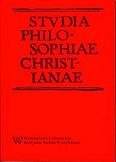Koncepcja logiki w wielkiej encyklopedii francuskiej. Studium z historii recepcji
Didactics of logic in KEN schools and the conception of logic in the "Encyclopédie ou dictionnaire universel raisonné"
Author(s): Stanisław JaneczekSubject(s): Philosophy
Published by: Wydawnictwo Naukowe Uniwersytetu Kardynała Stefana Wyszyńskiego w Warszawie
Keywords: logics; conceptions of logics
Summary/Abstract: The paper discusses some problems of the conception of logic in the "Encyclopédie ou dictionnaire universel raisonné". Aside to its original edition, the copy edited by Franceso (Fortuné Barthélemy) de Félice is taken into account. The two editions are in accordance with modern preferences, they make the importance of traditional logic relative, i.e. transforming it into a science on method or even an outline of epistemology, nevertheless they tend, in an eclectic manner, to legitimate the elements of logic that had been defined as formal logic since the times of I. Kant, although in a modest form. It is difficult to prove, however, which of the versions of the Encylopaedia is more unanimous in its assessment of logic. Generally speaking, the Encyclopaedia edited by de Félice seems to be more reserved in its modification or even questioning the usefulness of the study of logic. It is not always consequent in this approach, however, and at times it is even better than the original modern edition with respect to its tendency to reduce logic to a method of analysis. If, however, one can find in the Encyclopaedia some entries that support the traditional theory of reasoning, although in a limited form, then following the Logic of Port-Royal the interpretation of these reasonings does not have a purely formal character because – as in Descartes – their value is ultimately conditioned by the obvious character of the first principles subjectively understood, and by the relationship between the elements of the series of implications, defined for instance in the category of deduction. Generally, however, one can see a preference for a critique of traditional logic formulated in the spirit of empiricism with regard to the scope of knowledge and theory of science, especially in the approaches of F. Bacon, J. Locke and É. Condillac. This preference is eclectically in accord with R. Descartes’ methodology. This accounts for a willingness to refer to the "Logic of Port-Royal", or to a certain extent the accomplishments of Ch. Wolff. To sum it up, the solutions assumed by the two editions are closest to J. Le Rond d’Alembert's eclectic aproach. The preference for the method of scientific discovery over the method of interpretation makes the rules of traditional logic relative, i.e. formulated to build a systemic structure of science, especially because the rules of traditional logic are replaced by mathematical method. In this case the Encyclopaedia eclectically does not make it absolute either, and postulates its being used either to make the synthetic method legitimate or as a series of proof characteristic of Euclides' geometry, or as methods of algebra linked with analytical method and identified with procedures of scientific discovery.
Journal: Studia Philosophiae Christianae
- Issue Year: 46/2010
- Issue No: 2
- Page Range: 5-24
- Page Count: 20
- Language: Polish

